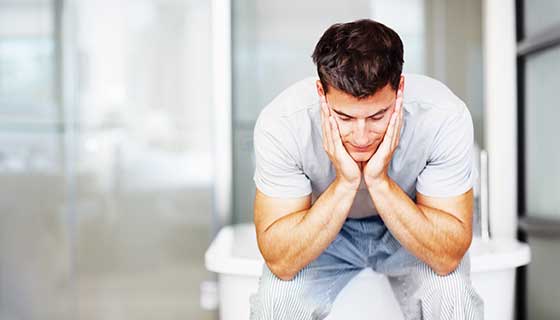Men with benign prostatic hyperplasia may or may not experience symptoms and they may require treatment of various forms to combat their symptoms. While there is no way to prevent BPH, medical treatments and prescription medications can improve symptoms.
Supplemental treatments such as exercise, healthy diet, and supplements such as Prostate 911 can also help men with BPH gain control of their symptoms. Continue reading to learn how men can respond to BPH and when men should go see a doctor about their symptoms.
What Is BPH?
BPH is a condition affecting the male organ, the prostate. The prostate is walnut-shaped and located just beneath the bladder. It surrounds the urethra, which carries urine and semen.
As men age, they are more likely to experience an enlargement of the prostate. It doubles in adolescence and it starts to grow at around 25, all through adulthood. If the prostate becomes too large, it can put pressure on the urethra and trigger urinary issues, such as nocturia, difficulty urinating, and frequent urination.
Around 50% of men have an enlarged prostate by age 50 and around 90% of men have an enlarged prostate by the time they reach 80.
What Are the Symptoms of BPH?
The symptoms of BPH vary depending on the person, but the most common symptoms include the following:
- Frequent or urgent need to urinate
- Increased frequency of urination at night (nocturia)
- Difficulty starting urination
- Weak urine stream or a stream that stops and starts
- Dribbling at the end of urination
- Inability to completely empty the bladder
Less common symptoms include the following: less common signs and symptoms include:
- Urinary tract infection
- Inability to urinate
- Blood in the urine
Your prostate size doesn’t necessarily affect symptom severity. Some men with only marginally enlarged prostates experience severe symptoms while others with excessively enlarged prostates might not experience any symptoms. The reason for this is unknown and symptoms can improve and stabilize over time.
When Should I See a Doctor?
It’s important to understand prostate-growth is a normal part of the aging process. However, experiencing difficulty urinating isn’t normal. Even if you can bear the symptoms, it’s worth getting diagnosed by a medical doctor if you have common BPH symptoms such as:
- Dribbling at the end of your stream
- DIfficulty urinating
- Abnormal frequency of urination
- Nocturia (peeing excessively at night)
- Weak urine streams
Some urinary problems are more severe and require immediate medical attention. They include the following:
- Inability to urinate
- Intense pain or discomfort in your lower belly
- Blood in your urine
- An Immediate need to urinate
- Painful urination accompanied with fever and chills
Who Is More Likely to Get BPH?
The following factors increase your likelihood of experiencing an enlarged prostate:
- Age- BPH is more common in older men and doesn’t typically affect men under the age of 40.
- Family history- If you have a history of BPH in the family, you have a higher chance of experiencing symptoms.
- Ethnicity- BPH affects more white and black men than Asian men and black men typically experience symptoms at a younger age.
- Some health conditions increases your likelihood of experiencing BPH symptoms such as:
- Diabetes, heart disease, and issues with blood flow
- Erectile dysfunction
- Obesity
- The use of beta blockers
Can Lifestyle Changes Help BPH?
Lifestyle changes can’t prevent BPH, but they can help you manage symptoms and improve your overall prostate health. Exercising and maintaining a healthy diet helps manage your weight, which is one of the contributing factors to BPH symptoms. Exercise also aids in bladder function, helping you empty your bladder at a normal rate. You can also use the following methods to control your symptoms:
- Avoid or limit decongestant and antihistamine usage during cold and allergy outbreaks as they can tighten the muscles that control urine flow and make urination more difficult.
- Exercise to strengthen your pelvic floor muscles.
- Limit your caffeine and alcohol intake. These substances increase urination frequency and can irritate the lining of your bladder.
- Limit the amount of fluids you drink before going to bed. This helps avoid symptoms of nocturia.
- Pee when you feel the urge instead of holding it. This relieves stress from the bladder.
- Stay warm. Cold temperatures can increase the urgency of urination.
- You can try supplements that contain healthy ingredients such as Prostate 911 to potentially improve your symptoms.
What Are the Complications of BPH?
Complications of BPH can include the following:
- Sudden inability to urinate (urinary retention): This condition might require the use of catheters to drain your bladder. Some men with enlarged prostates need surgery to relieve urinary retention.
- Urinary tract infections (UTIs): the inability to urinate can cause urine to get trapped in the bladder and cause persistent UTIs. If they occur frequently, you might need surgery to remove a portion of the prostate.
- Bladder stones: Bladder stones are typically caused by an inability to completely empty the bladder. Bladder stones can cause infection, bladder irritation, and blood in the urine.
- Bladder damage: Incomplete bladder emptying can cause it to stretch and weaken. Over time, the muscle wall of the bladder will no longer contract as it should, increasing the difficulty of emptying your bladder.
- Kidney damage: Pressure building up in the bladder from urinary retention can directly cause damage to the kidneys or let bladder infections reach the kidneys.
Key Takeaways
BPH cannot be reversed and enlarging prostates can’t be avoided. However, there are lifestyle changes men can make to reduce symptom severity and maintain overall prostate health. Because BPH is not, in and of itself, a harmful condition, you might not need any advanced medical treatment. If symptoms are mild, you might be able to benefit from supplements, exercise, and a healthy diet.

